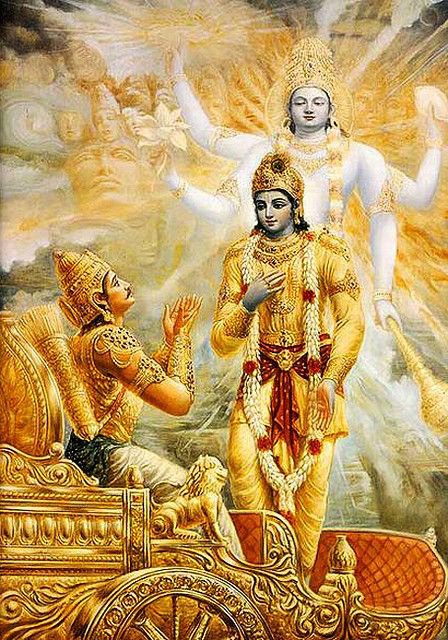Bhagavad Gita, The Song of God - Chapter-3.1. Swami Mukundananda.
Friday 20, December 2024. 10:50.
Srimad Bhagavad Gita:
Chapter 3: Karma Yogam: The Yogam of Action:
Swami Mukundananda.
======================================================================================
Karma Yogam:
Introduction:
Sri Krishna expounds on karm yogm or the yogam of action in this chapter. He explains to Arjun that nobody can remain without action, even for a moment. Bound by their inherent modes of nature, all beings are always engaged in some work. Superior are those who practice karm yog and continue to work diligently to fulfill their responsibilities externally, but internally they are unattached to them. However, the hypocrites display external renunciation but internally dwell upon the objects of their senses.
Shree Krishna says that all living beings are an integral part of God’s creation and have roles and responsibilities to fulfill. Vedas prescribe performing yajña to please the celestial gods, who in-return bestow material gains. These yajnas cause rains to fall, which aids in the production of food grains for the sustenance of life on earth. Those who live only for the delight of their senses and do not accept their responsibility in this cycle— are sinful and living in vain. However, Shree Krishna says that when works or prescribed duties are performed as an obligation to God, they are also considered yajna (sacrifice).
He then explains that unlike the rest of humankind, the enlightened souls are not obliged to fulfill their bodily responsibilities. They are situated in knowledge of the self and execute higher responsibilities of the soul. However, they do not abandon their social duties, as it may create disharmony in the minds of the common people who look up to them for inspiration. Therefore, the wise continue to work without any personal motive only to set good examples for others to follow, else, the ignorant may abandon their prescribed duties prematurely. Shree Krishna mentions one such example of the enlightened King Janak, who performed his earthly duties as an ideal king and father.
Arjun then asks Shree Krishna why people commit sin, even when unwilling, as if by some force. Lord Krishna explains that lust alone is the sinful all-devouring enemy. Similar to a fire that is covered by smoke or a mirror covered in dust, desire shrouds one’s knowledge and deludes the intellect. In the end, Shree Krishna advises Arjun that by controlling the senses, mind, and intellect—one can slay this enemy called desire, which is an embodiment of sin.
=====================================================================================
Slogas 1&2.
Arjuna uvacha,
1
"jyayasi chet karmanas te mata buddhir janardana
tat kim karmani ghore mam niyojayasi Keshava."
2
" vakyena buddhim mohayasiva me
tad ekam vada nishchitya yena shreyo ’ham apnuyam."
=====================================================================================
Translation:
BG 3.1-2:
"Arjun said: O Janardan, if You consider knowledge superior to action, then why do You ask me to wage this terrible war? My intellect is bewildered by Your ambiguous advice. Please tell me decisively the one path by which I may attain the highest good."
====================================================================================
Commentary:
Chapter one introduced the setting in which Arjuna’s grief and lamentation arose, creating a reason for Sri Krishna to give spiritual instructions. In chapter two, the Lord first explained knowledge of the immortal self. He then reminded Arjun of his duty as a warrior, and said that performing it would result in glory and the celestial abodes. After prodding Arjun to do his occupational work as a Kshatriya, Krishna then revealed a superior principle—the science of karm yogam—and asked Arjun to detach himself from the fruits of his works. In this way, bondage-creating karmas would be transformed into bondage-breaking karmas. He termed the science of working without desire for rewards as buddhi yogam, or Yogam of the intellect. By this, he meant that the mind should be detached from worldly temptations by controlling it with a resolute intellect; and the intellect should be made unwavering through the cultivation of spiritual knowledge. He did not suggest that actions should be given up, but rather that attachment to the fruits of actions should be given up.
Arjuna misunderstood Krishna’s intention, thinking that if knowledge is superior to action, then why should he perform the ghastly duty of waging this war? Hence, he says, “By making contradictory statements, you are bewildering my intellect. I know you are merciful, and your desire is not to baffle me, so please dispel my doubt.”
*****
Continued









Comments
Post a Comment